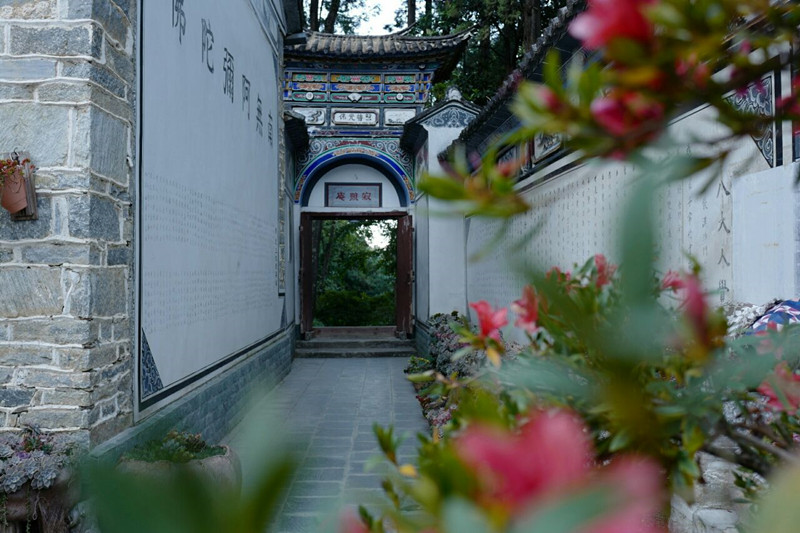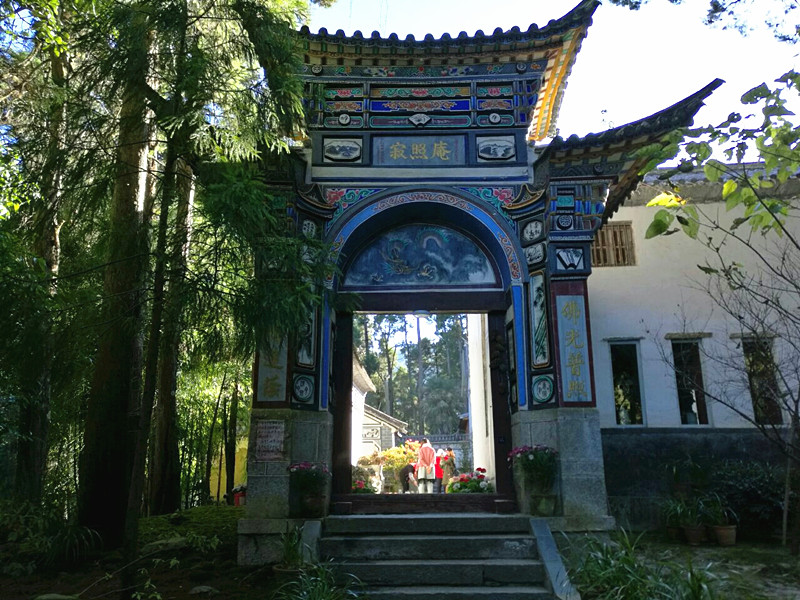JizhaoAn Nunnery in Dali City
Overview
JizhaoAn Nunnery (寂照庵, Jìzhào’ān), located in Dali Bai Autonomous Prefecture (大理白族自治州, Dàlǐ Bái Zìzhìzhōu), within the Cangshan Scenic Area (苍山, Cāngshān), is open year-round from 08:00 to 17:30.
Nestled at the southern foot of Shengying Peak (圣应峰, Shèngyìng Fēng) of Cangshan, JizhaoAn is surrounded by lush pines and ancient cypress trees, creating a serene atmosphere that feels like a Buddhist sanctuary. Unlike typical nunneries, it exudes a tranquil charm rather than solemnity, resembling a vibrant garden filled with flowers and the sounds of birds. The interiors are thoughtfully arranged, with two flowerbeds in the backyard showcasing a variety of beautiful flowers and succulents, making it a popular spot for social media enthusiasts.
Known as the most beautiful nunnery in China, JizhaoAn’s name reflects its essence: “Perception leads to communication, and tranquility illuminates understanding” (感而遂通,寂静照鉴).
Jizhao Nunnery (寂照庵, Jìzhào ān), named from the phrase “Feeling and then pass, silent as a warning,” is located at the foot of Cangshan Mountain (苍山, Cāngshān) in Dali (大理, Dàlǐ). This serene site is nestled among ancient cypress trees and is renowned for its vibrant gardens, lovingly cultivated by Master Miao Hui (妙慧法师, Miàohuì fǎshī) over the decades.
A Blossoming Sanctuary
The nunnery is a colorful haven filled with an array of plants and flowers, showcasing the dedication of Master Miao Hui. Not only has she achieved great success in planting various flora, but her notable accomplishment lies in the cultivation of succulents. The temple grounds are adorned with thriving plants, showcasing potting, soil arrangements, and even hanging displays that breathe life into every crevice.
A Popular Retreat
Jizhao Nunnery has become a beloved destination for many visitors, with women often expressing a desire to stay longer due to its warm ambiance and elegant courtyard. It’s celebrated as “the most petty bourgeoisie temple in China” and “the most beautiful nunnery,” drawing praise from guests who admire its charm.
Vegetarian Delights
As we conversed, more people gathered outside, waiting eagerly to enjoy the nunnery’s vegetarian meals (斋饭, zhāi fàn). Priced at 20 yuan per person, these meals feature an assortment of delicious dishes prepared with care. The culinary offerings have garnered high praise, leading to many guests requesting seconds.
The Heart of the Nunnery
Master Miao Hui embodies the spirit of dedication, cultivating not only flowers and plants but also fostering a nurturing environment for all who visit. Her commitment to serving delicious vegetarian meals reflects the ethos of the monastery, making Jizhao Nunnery an ideal place to experience monastic life and embrace the essence of Dharma.
Scenic Beauty
Reaching JizhaoAn requires a hike, taking about half an hour along scenic paths. When you spot the clusters of hydrangeas along the way, you’ll know you’re close. The journey leads you through an enchanting landscape, adorned with diverse flora that creates a unique paradise in the mountains.
The plants here quietly embody the meaning of purity. Instead of incense, JizhaoAn focuses on planting flowers. Each flower represents a world, and every leaf symbolizes enlightenment (一花一世界,一叶一菩提).
Experience
Visitors often marvel at the elegant details that enhance the serene atmosphere. A satisfying trip culminates with a bowl of vegetarian rice, priced at 20 yuan.
JizhaoAn, acclaimed as the most artistic nunnery in China, is nestled within the lush landscape of Cangshan, attracting numerous visitors throughout the year. It enjoys heightened popularity during peak seasons, bustling with tourists.
Visitor Insights
Typically, mornings see the highest influx of visitors, and during peak times, waiting for a vegetarian meal can take 30 to 60 minutes. The flower gardens often become crowded, making photography challenging.
Reasons to Visit
- Convenient access and manageable hiking trails make it easy to explore JizhaoAn.
- The nunnery provides a refreshing retreat during summer, offering a cool escape from the heat.
- The diverse and beautiful flowers create a perfect backdrop for photography.
- The vegetarian cuisine is highly praised, attracting a steady stream of diners.
Tips for a Quiet Visit
To avoid crowds and enjoy a tranquil experience, consider visiting in the afternoon:
- Dali tourism is about embracing a slower pace of life. After lunch, take a moment to relax and perhaps nap to escape the midday heat and intense UV rays.
- Depart from your inn around 3 PM, energized for the hike to Cangshan and JizhaoAn. On your way, you can explore the ancient Gantong Temple (感通寺, Gǎntōng Sì), known for its legendary tales.
- The walk from the Gantong Temple to JizhaoAn is about 1.5 kilometers with an elevation gain of approximately 150 meters. This area is ideal for all ages, providing a leisurely yet accessible experience.
- In the afternoon, fewer visitors create a peaceful environment, perfect for enjoying the surroundings with friends or family, sipping tea, or simply taking a moment to reflect in solitude.
- Dinner service begins at 5 PM, with shorter wait times for vegetarian meals.
Conclusion
JizhaoAn is a hidden gem in Dali, providing a serene escape from the bustling crowds. Whether you’re there to admire the flora, enjoy the tranquility, or savor the delicious vegetarian food, it’s a place that captivates the spirit.
How to Get There
To reach JizhaoAn, start your journey from the ancient town of Dali. You can take a taxi to the Cangshan Gantong Cableway (苍山感通索道, Cāngshān Gǎntōng Suǒdào) for a quick ride. Alternatively, you can walk directly to the entrance of Cangshan National Geological Park (苍山国家地质公园, Cāngshān Guójiā Dìzhì Gōngyuán) and follow the signs to JizhaoAn.
Travel Tips
- The weather in Dali can be unpredictable, so it’s wise to carry rain gear.
- To protect the environment, remember to return your utensils to the washing area after meals.
- Take your time to explore the various nooks and corners of the nunnery, capturing the beauty of nature and tranquility.
Travel Blog about JizhaoAn Nunnery in Dali.


















